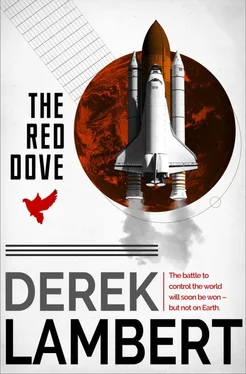‘I see no harm in telling my oldest friend that I’m going to ask the girl I love to marry me.’
‘It’s too late,’ she said.
‘What’s too late?’
‘Words like that. The girl I love… you can’t escape under camouflage, Nicolay.’ With a sudden movement she swallowed the rest of her champagne as the waiter arrived with the wine and the shashlik. ‘Why don’t you marry Sedov?’
‘Shush.’
‘Why should I shush? You ask me to marry you and then tell me you’ve already consulted Oleg Sedov. What if he had said no? Would you still have asked me?’
‘Please.’ Talin nodded towards the waiter who had backed away.
Sonya’s hand tightened on the champagne glass. The fragile stem snapped and a spot of blood appeared on her finger.
Both the waiter and Talin reached forward to stem the blood with napkins but Sonya reached into her purse and brought out a tiny pink handkerchief. ‘I can manage,’ she said.
The waiter cleared away the broken glass and served the food and wine. Then he lit a candle on the table. The flame burned without movement in the silence between Talin and Sonya.
Talin began to eat, slowly and without appetite.
Sonya said after a while: ‘I’m sorry, Nicolay, it’s just that I thought this at least would be between the two of us.’
‘You didn’t answer my question,’ Talin remembered, picking at his food.
‘I told you, I guessed you were going to ask me. I felt it.’
He drank some of the red wine and began to relax. It was, after all, he who had been clumsy; she hadn’t known, merely sensed – feminine intuition.
He held up his glass. ‘Here’s to us.’
They touched glasses; she smiled, lips trembling, and he noticed that there were tears in her eyes.
‘I wish,’ Talin said after a while, ‘that you liked Sedov a little more.’
‘I wish I did,’ she said, ‘for your sake.’
‘Why don’t you?’
‘I think he’s a poseur. I find his act boring and irritating.’
‘What act?’
‘You know, the dull clothes, the drab little apartment. All perfectly understandable if you are poor but Sedov isn’t; he’s the most respected cosmonaut in the Soviet Union. Among other things,’ she added to show that she understood his dual role. ‘So what, I wonder, does he do with all his money?’
‘That’s his business,’ Talin said. He didn’t mind any of this: it was good to have it out in the open.
‘And I don’t like his attitudes. He acts as though he were one of the old Bolsheviks, as though he were a sage; he’s not that old for God’s sake. What’s more,’ Sonya hurried on, encouraged by Talin’s good humour, ‘I don’t trust his brand of Communism, it’s too cynical.’
‘There,’ said Talin placidly, ‘I think you’re wrong. True, he seems cynical but that’s only a façade.’
‘I think his outlook is out of date but he won’t admit it,’ Sonya blurted out. ‘He’s the sort of Party hack who would like us still to be in the dark ages of Communism when revolution was the only answer. Now that we have so much he finds refuge in cynicism.’
Sometimes, Talin thought, Sonya couldn’t see far beyond the walls of the Bolshoi. He and Sonya and the like had so much , it was true, but millions had very little. Her beliefs were as bright and true as a crusader’s sword but confined, the philosophy of the élite.
And my beliefs? he pondered. Essentially they were the same, except that he gazed beyond the perimeter of privilege and saw hypocrisy. The Kremlin vilified colonialism and yet it colonised; it preached peace and waged war. Talin had been into space.
Glimpsing the obstacles that lay ahead of them, Talin poured more wine and said: ‘Let’s forget Sedov for today.’ The flame of the candle wavered, then found strength.
‘I do love you,’ Sonya said.
In the background a violinist with a brigand’s face began to play music from the mountains of Georgia.
Later in Sonya’s apartment in the Arbat they made love; and their love-making was more acutely satisfying than it had ever been before, the love-making of the betrothed.
The Ilyushin on the delayed Flight SU-318 from Washington to Moscow touched down at Sheremetyevo Airport just before midnight.
Massey and the rest of the package party were driven by mini-bus through dark, snow-patched streets to their hotels. His companions chattered excitedly but, sensing cruelty outside, Massey was silent.
It was beginning to snow. The flakes charged the bus like moths before veering away. Woods of silver-birch flitted past, skeletons on the march.
Massey noticed the blurred outline of looming wooden crosses tilted to look like battlefield fortifications. ‘Where the glorious armies of the Union of Soviet Socialist Republics defeated the forces of German Fascism in the Great Patriotic War,’ their girl courier recited into a microphone.
‘Is where they stopped the Krauts in World War II is what she means,’ a man in the party translated.
Could anything defeat the Russians? Massey wondered as the mini-bus crossed a bridge and dived into a brightly-lit tunnel.
Their hotel, the Ukraina, reminded Massey of Grand Central Station. It took the party an hour to register.
In his room at last, Massey undressed and climbed into bed. The sheets were cold. He closed his eyes and wondered whether, if he talked in his sleep, his words would be recorded on a hidden microphone.
When he awoke in the morning the room was filled with bright snow-light and his fears had fled. Today, he thought, the battle for the soul of Nicolay Talin begins.
‘It’s arrived,’ Talin said, standing at the window in his dressing-gown gazing at the falling snow.
‘What’s arrived, Nicolay?’ Sonya’s voice, buried in the pillow, was muffled and sleepy.
‘Winter. The first snow was a warning. This is the real thing. Moscow will be locked up for seven months now.’
She turned lazily on the bed. ‘Don’t sound so cheerful about it,’ she said, ‘and before you start telling me about winters in Siberia go and make some tea.’
Smiling, he bent down and kissed her. ‘Did I ever tell you—’
‘Yes,’ she said. ‘Tea.’
In the tiny kitchen he boiled water and sliced a lemon. Faintly he could hear the scrape of the babushkas’ shovels on the sidewalks. That meant the snow had stopped for a moment; during each pause the old women pounced, then retired fatalistically to watch the next fall cover their handiwork.
He brought the tea into the bedroom. The snow had stopped but the sky was still full of it. Sonya’s apartment was on the top floor of an old, four-storey block; from the window he Could see the white, envelope roofs of the few antique wooden houses still standing in the Arbat; beyond towered high-rise blocks; through a gap he could see the gold dome of a disused church.
Sonya sat up in bed and took the cup of tea. ‘We should buy a samovar,’ she said. She was wearing a filmy white nightdress with flowers embroidered at the neck; through the material he could see her breasts and was instantly aroused.
Carrying his cup of tea, he left the blue and white bedroom and went into the living room. It contained the usual dark furniture, fumed oaks and mahoganies, but Sonya had lightened the atmosphere with touches of grace and comfort. A small chandelier hung with cut-glass tears was suspended from the ceiling; one wall was crowded with photographs of ballet dancers – Pavlova was there, frozen in a pirouette – a low-slung, modern chesterfield imported from Finland was scattered with red and orange cushions; a rubber plant with shiny green leaves was climbing around two icons that glowed with the colours of winter fires.
Читать дальше
Конец ознакомительного отрывка
Купить книгу












